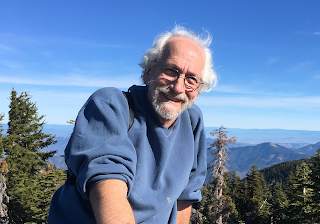A few days ago I listened in disbelief as the chair of the meeting of the Josephine County Commissioners told us that the board would not accept the Williams Community Forest Project's offer of over two million dollars to buy the forests of Pipe Fork.
"I know you have worked hard to raise this money," he said, apologetically, "and I know the strong feelings you have about Pipe Fork. But you are more than $750,000 short of what we want for the land."
Let's see. They originally said if we came up with $1.6 million, we could have the land. We looked and looked for an environmental philanthropic organization that would buy the land and turn it over to the Bureau of Land Management to add to the Resource Natural Area the BLM established on Pipe Fork
decades ago. We found that buyer. We had an assessment made and came up with $2 million to meet the assessment price—more, as you see, than we were originally told we needed. Now the commissioners had raised the price. They would keep the land and sell the timber.
 |
| Imagine this scene, clearcut Photo by Kevin Peer |
"There are other people in the county who need what this money could bring," the commissioner said. "We will go ahead with our plans to clearcut Pipe Fork."
It is to my credit that I didn't spit in his face as I left the building.
We are just a little local organization passionately attached to our local stream, Pipe Fork, for its beauty, the importance of it as a water source for the community, and its ecological importance. We are just a handful of people, yet we raised more than two million dollars.
Those three years of work—and anxiety—came to a close at the commissioners' meeting on Tuesday, yet I cannot accept that reality. I cannot envision a clearcut Pipe Fork. It just should never happen. It just simply cannot happen.
 |
| This environment depends on a forest canopy. Photo by Kevin Peer |
If the commissioners are thinking, "Well, thank goodness that's over. Now we can get on with cutting the timber"—if they think we're going to have a little grieving ceremony for the trees and accept their fate—they're wrong. Cheryl Bruner, head of WCFP, said, "It's not over, and we will continue to fight."
Saying that there were places in the county where the money was needed strikes me as a myopia we can no longer indulge in. When will we begin to understand that saving any portion of the environment, this small area of Pipe Fork, for instance, is in the interest of us all? When will we start seeing that destroying our forests for a handful of bills now means devastation for everyone later? Pipe Fork is important for the groundwater of Williams, where all residences depend on wells. If our wells run dry, will the county supply our water? Isn't everyone better off if we can continue to irrigate our fields (important agricultural income for many Josephine County residents) and supply our domestic water from our watershed? The Conservation Fund was willing to pay more than $2 million dollars for Pipe Fork, not to appease a small group of passionate citizens but because, in the bigger picture, the land is more valuable intact than the timber is worth, cut.
But the commissioners said no.
We all live on this planet. Every ecological destruction affects us all. Yes, we who live in Williams are most acutely affected by a potential, unimaginable clearcut on Pipe Fork, but, in the long haul, it should be unimaginable for everyone in the county.
 |
| Photo by Kevin Peer |
Go to williamscommunityforestproject.org/save-pipe-fork to see a video of Pipe Fork by renowned videographer Kevin Peer.
.jpg)




